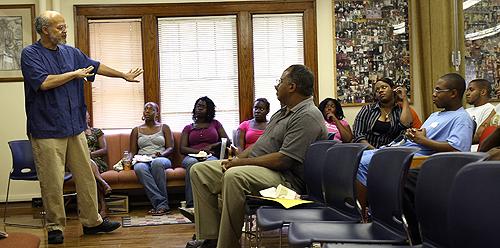UI African American Center guiding students to success

Professor Abdul Alkalimat speaks to students and faculty at the African American Cultural Center for a luncheon on Wednesday. “Help yourself, get a job, and help your community,” said Alkalimat who spoke about getting role models and succeeding during and Erica Magda
September 6, 2007
Editor’s note: This is the first in a series profiling the different cultural houses on campus.
On a typical day, Ashton Clark, sophomore in Business, will pay a visit to the Bruce D. Nesbitt African American Cultural Center, located on 708 S. Mathews Ave., between classes to cool off or print his lecture notes.
The center allows students to achieve their personal goals in a culturally specific way, said Nathaniel Banks, director of the center and assistant dean of students.
Students can participate in an eclectic range of activities and engage in resources in accordance with their interests. Students can contribute to the newsletter, participate in a dance ensemble or perform music. Another goal of the center is to inform the campus regarding issues and concerns affecting the black student population, Banks said.
“Our focus is primarily on students interested in African-American issues, but any student is more than welcome to participate,” Banks said.
Get The Daily Illini in your inbox!
The center opened its doors to primarily black students in the fall of 1969 in compliance with students’ demands for a center to nurture a sense of belonging on campus.
It subsequently became the oldest existing cultural center on campus.
“It’s a good resource for African-American students or any minority student,” said Frederick Geiger, junior in AHS. “It’s a home away from home.”
With the number of resources available this year, the center is dedicated to incoming black freshmen students through the 100 Strong program.
This yearlong orientation program emphasizes the significance of achieving a 100 percent retention and graduation rate. If students become active within the 100 Strong program from their first year, their likelihood of success at the University will be greatly enhanced, Banks said.
Ashton Clark, social chair of 100 Strong, used the 100 Strong program last year to interact with new and existing students and become a regular at the center.
“I saw the Cultural Center as an opportunity for me to further work on my academics,” Ashton Clark said. “I’m glad I was aware of the Cultural Center and everything it encompasses.”
In addition to the center’s resources and multicultural programs, it is also considered to be a refuge for black students on campus, Banks said.
Ryan Clark, sophomore in Business and 100 Strong committee member, said he has experienced racial slurs on campus, but the center has allowed him to discuss his situations with others who have had the same experience.
Despite the center’s homelike presence for black students, some students have voiced their dissatisfaction with the current facility.
“The size of the house cannot really hold all of the students. It’s so old and outdated,” Ashton Clark said. “So much learning is in the classroom, but there’s so much learning outside of the classroom.”
Banks said the cultural center is not conducive to the work and contributions that individuals of the center make to the campus.
For now, many black students still make best with the facility they have and taking advantage of the resources the center has to offer.
“The culture center is marvelous,” Ryan Clark said. “It’s something if I didn’t know existed, I’d be missing out on something.”






